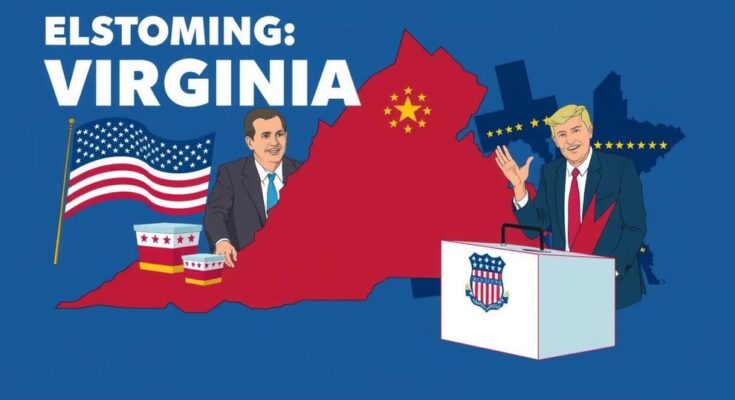Virginia’s special elections test party strength before the 2025 gubernatorial race, with key contests determining potential shifts in legislative control. Democratic candidates are focused on maintaining reproductive rights and education funding priorities, while Republicans aim to solidify their influence in historically conservative districts. The elections are closely watched for their implications on future policy and governance.
The special elections in Virginia’s General Assembly represent a pivotal moment ahead of the 2025 gubernatorial campaign, testing party strength and voter sentiment following the recent elections. These elections could either uphold Democratic control or indicate a shift in momentum favoring the Republican Party. The races have garnered national attention due to the implications they hold for legislative priorities and party dynamics within the state.
In the 32nd Senate District, Democratic Delegate Kannan Srinivasan seeks to retain the seat against Republican Tumay Harding after U.S. Representative-elect Suhas Subramanyam vacated his position. In the 26th House District, Democrat J.J. Singh competes against Republican Ram Venkatachalam to occupy Srinivasan’s former seat. Both contests are viewed as critical, highlighted by investments from the Democratic Legislative Campaign Committee.
The competitive 10th Senate District features Democrat Jack Trammell contending with Republican Luther Cifers to fill the vacancy left by former Senator John McGuire. With significant support for Trump and Governor Youngkin in the district, Cifers is considered the frontrunner in this historically Republican area.
As Virginia lawmakers contemplate the allocation of a $2 billion surplus, disagreements on budget priorities arise, particularly between tax relief for workers and education funding. Furthermore, reproductive rights are central to the electoral narrative, with Democratic candidates asserting their commitment to safeguarding abortion access, while Republican nominees demonstrate less clarity on their positions.
In the 10th District race, Trammell supports a proposed constitutional amendment to enshrine abortion rights, contrasting sharply with Cifers, who opposes abortion without exceptions. The prospect of maintaining a Democratic majority is crucial for advancing legislative measures related to reproductive rights, particularly in light of the political landscape shifting with Trump’s impending return to the presidency.
The Supreme Court’s 2022 decision to overturn federal abortion protections has intensified the political debate surrounding reproductive rights, making it a key issue for both state and national campaigns.
The article provides insight into the significance of Virginia’s special elections in shaping political dynamics ahead of the 2025 gubernatorial race. As these elections unfold, they will test Democratic control against perceived Republican momentum in a state that is closely monitoring the national sentiment following the recent midterms. The importance of reproductive rights and funding priorities further underscores the contentious political environment as stakeholders prepare for upcoming budget negotiations and legislative initiatives.
The special elections in Virginia serve as a barometer for voter sentiment and party strength ahead of the 2025 gubernatorial race. Key races in the state legislature, particularly concerning reproductive rights and budget priorities, illustrate the evolving political landscape. The outcomes of these elections will likely influence the direction of policy initiatives and party dynamics as Virginia navigates its future in a changing national context.
Original Source: virginiamercury.com




